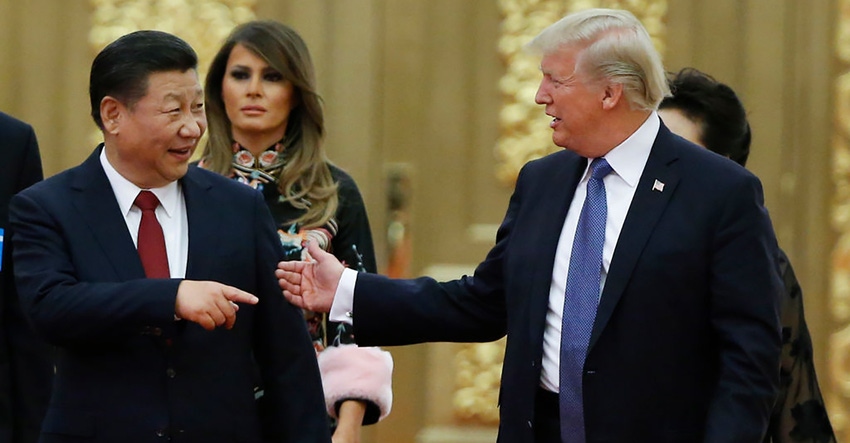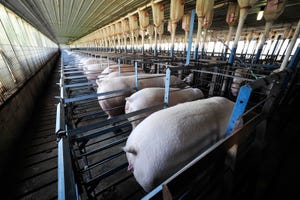Legislative Watch: China trade war discussions at G20; Mexico approves USMCA; feral swine eradication program; FY ’20 ag appropriations considered; haying, grazing dates changed; USDA controls NBAF.

President Trump and Chinese President Xi Jinping will meet next week during the G20 meeting in Japan to discuss the current trade war and to try and determine next steps.
U.S. Trade Representative this week held public hearings on Trump’s proposal to place a 25% tariff on an additional $300 billion of Chinese goods. The president is expected to make a decision after the meeting with President Xi.
Mexico approves USMCA
Mexico became the first country to ratify the U.S.-Mexico-Canada Agreement. Canada has indicated it plans to vote on the agreement when the United States considers the USMCA.
The USTR will be meeting with the Democratic trade working group established by Speaker Nancy Pelosi (D-CA) to address concerns with the USMCA. The group will consider labor, environment, drug pricing and enforcement issues.
Feral swine eradication
The USDA announced a $75 million pilot program, the “Feral Swine Eradication and Control Pilot Program,” aimed at the eradication and control of feral swine. The program is a joint effort between the USDA’s Natural Resources Conservation Service and the Animal and Plant Health Inspection Service. The pilot projects will be in Alabama, Arkansas, Florida, Georgia, Louisiana, Mississippi, North Carolina, Oklahoma, South Carolina and Texas.
House considers FY ’20 ag appropriations
The House of Representatives began consideration of a five-bill appropriations minibus that included the Fiscal Year ’20 agricultural appropriations bill. The $155.3 billion agriculture bill includes both mandatory and discretionary spending. Discretionary spending is set at $24.3 billion which is $1 billion above last fiscal year. It rejects President Trump’s proposed cuts of 15% to USDA programs.
The bill prioritizes funding for agricultural research and international food aid. It also provides for a third round of funding for rural broadband expansion.
USDA research programs would receive $3.3 billion which is $387 million greater than the administration’s proposed budget. The National Institute of Food and Agriculture, which funds research projects at universities, would receive $1.02 billion, an increase of $90 million over FY ’19.
The Food for Peace program would be funded at $1.85 billion and the McGovern-Dole international school feeding program at $235 million. The administration recommended ending these international food aid programs.
The bill prohibits some of the administration’s policies:
Prohibits USDA from moving forward with the USDA’s pork modernization proposal until: 1) Office of Inspector General reports to Congress findings on the data used by USDA in support of the development and design of the swine slaughter inspection program that is the subject of such proposed rule, and 2) Food Safety and Inspection Service addresses OIG’s findings.
Prohibits to the administration’s plans to move the Economic Research Service and NIFA outside of Washington, D.C.
The administration’s Statement of Administrative Policy informed the House that if changes were not made to the bill, administration officials would recommend the president veto the bill. Regarding the agricultural portion of the bill, the administration is opposed to the funding of the McGovern-Dole international school feeding program; the prohibition of USDA moving forward with the pork modernization proposal; and the prohibition of moving ERS and NIFA to Kansas City, Mo.
The House plans to pass the bill next week.
Haying and grazing dates changed for prevented planting
USDA will allow farmers who planted cover crops on prevented plant acres to hay, graze or chop those fields beginning Sept. 1 instead of Nov. 1. This is to help farmers who were prevented from planting because of flooding and excess rainfall this spring. This change in policy is a one-year adjustment.
USDA’s Risk Management Agency determined that “silage, haylage and baleage should be treated in the same manner as haying and grazing for this year. Producers can hay, graze or cut cover crops for silage, haylage or baleage on prevented plant acres on or after Sept. 1 and still maintain eligibility for their full 2019 prevented planting indemnity.”
USDA takes control of NBAF
USDA and the Department of Homeland Security signed a Memorandum of Agreement that transfers the ownership and operations of the $1.25 billion National Bio and Agro-Defense Facility from the DHS’ Science and Technology Directorate to the USDA.
Under the agreement, the DHS will complete construction and commission of the facility. USDA will assume responsibility for all operational planning and operation of the facility. Transfer of ownership of NBAF is expected to take place in May 2021.
The NBAF will be a biosafety level-4 laboratory, located in Manhattan, Kan. It will be used to study diseases that threaten both U.S. agriculture and public health.
Source: P. Scott Shearer, who is solely responsible for the information provided, and wholly owns the information. Informa Business Media and all its subsidiaries are not responsible for any of the content contained in this information asset.
About the Author(s)
You May Also Like



